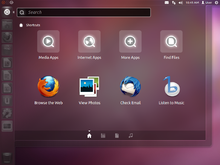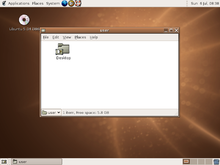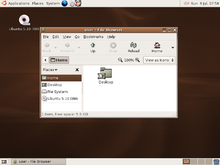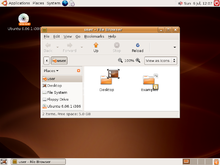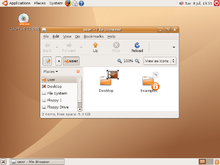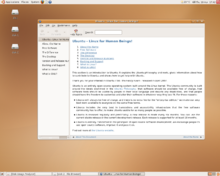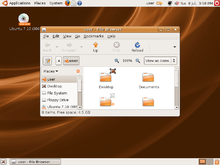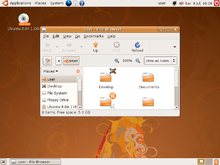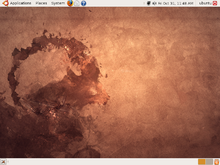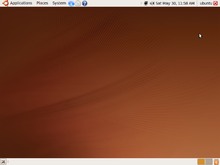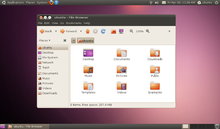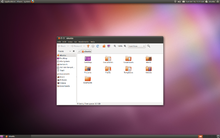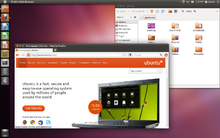- List of Ubuntu releases
-
Ubuntu releases are made semiannually by Canonical Ltd, the developers of the Ubuntu operating system, using the year and month of the release as a version number. The first Ubuntu release, for example, was Ubuntu 4.10 and was released on 20 October 2004.[1][2] Consequently, version numbers for future versions are provisional; if the release is delayed until a different month to that planned, the version number changes accordingly.[3]
Ubuntu releases are timed to be approximately one month after GNOME releases, which are in turn about one month after releases of X.Org, resulting in each Ubuntu release including a newer version of GNOME and X.[4][5][6]
To date every fourth release, in the second quarter of even-numbered years, has been designated as a Long Term Support (LTS) release, indicating that it has updates for three years for desktop use and five years for server, with paid technical support also available from Canonical Ltd. Releases 6.06, 8.04, and 10.04 are the LTS releases.[7] Non-LTS releases have typically been supported for over a year, and to date have always been supported until at least the date of the next LTS release. Therefore, users who have a non-LTS release can still safely set the Update Manager to notify about "LTS releases only" if they wish.
Naming convention
Ubuntu releases are also given code names, using an adjective and an animal with the same first letter (e.g. Dapper Drake). With the exception of the first two releases, code names are in alphabetical order, allowing a quick determination of which release is newer. Commonly, Ubuntu releases are often referred to using only the adjective portion of the code name (e.g. Dapper).[8]
Release history
Ubuntu 4.10 (Warty Warthog)
Ubuntu 4.10 (Warty Warthog), released on 20 October 2004, was Canonical's first release of Ubuntu, building upon Debian, with plans for a new release every six months and eighteen months of support thereafter.[2] Ubuntu 4.10's support ended on 30 April 2006.[9] Ubuntu 4.10 was the first version of Ubuntu to offer ShipIt services, allowing users to order free install CDs.[10]
Ubuntu 5.04 (Hoary Hedgehog)
Ubuntu 5.04 (Hoary Hedgehog), released on 8 April 2005,[11][12] was Canonical's second release of Ubuntu. Ubuntu 5.04's support ended on 31 October 2006.[13] Ubuntu 5.04 added many new features including an update manager,[14] upgrade notifier, readahead and grepmap, suspend, hibernate and standby support, dynamic frequency scaling for processors, ubuntu hardware database, Kickstart installation, and APT authentication.[15][16] Ubuntu 5.04 allowed installation from USB devices. Ubuntu 5.04 used UTF-8 by default.
Ubuntu 5.10 (Breezy Badger)
Ubuntu 5.10 (Breezy Badger), released on 12 October 2005,[17][18] was Canonical's third release of Ubuntu. Ubuntu 5.10's support ended on 13 April 2007.[19] Ubuntu 5.10 added several new features including a graphical bootloader (Usplash), an Add/Remove Applications tool,[20] a menu editor (alacarte), an easy language selector, logical volume management support, full Hewlett-Packard printer support, OEM installer support, a new Ubuntu logo in the top-left, and Launchpad integration for bug reporting and software development.[21]
Ubuntu 6.06 LTS (Dapper Drake)
Ubuntu 6.06 (Dapper Drake), released on 1 June 2006,[22][23][24] was Canonical's fourth release, and the first Long Term Support (LTS) release. Ubuntu 6.06 was released behind schedule, having been intended as 6.04. Development was not complete in April 2006 and Mark Shuttleworth approved slipping the release date to June, making it 6.06 instead.[25]
Ubuntu 6.06's support ended on 14 July 2009 for desktops and ended in June 2011 for servers.[26] Ubuntu 6.06 included several new features, including having the Live CD and Install CD merged onto one disc,[27] a graphical installer on Live CD (Ubiquity), Usplash on shutdown as well as startup, a network manager for easy switching of multiple wired and wireless connections, Humanlooks theme implemented using Tango guidelines, based on Clearlooks and featuring orange colors instead of brown, and GDebi graphical installer for package files.[28][29] Ubuntu 6.06 did not include a means to install from a USB device, but did for the first time allow installation directly onto removable USB devices.
Ubuntu 6.10 (Edgy Eft)
Ubuntu 6.10 (Edgy Eft), released on 26 October 2006,[30][31][32] was Canonical's fifth release of Ubuntu. Ubuntu 6.10's support ended on 25 April 2008.[33][34] Ubuntu 6.10 added several new features including a heavily modified Human theme, Upstart init daemon, automated crash reports (Apport), Tomboy note taking application, and F-Spot photo manager. EasyUbuntu, a third party program designed to make Ubuntu easier to use, was included in Ubuntu 6.10 as a meta-package.[35]
Ubuntu 7.04 (Feisty Fawn)
Ubuntu 7.04 (Feisty Fawn), released on 19 April 2007,[36][37][38] was Canonical's sixth release of Ubuntu. Ubuntu 7.04's support ended on 19 October 2008.[39] Ubuntu 7.04 included several new features, among them a migration assistant to help former Microsoft Windows users transition to Ubuntu, support for Kernel-based Virtual Machine, assisted codec and restricted drivers installation including Adobe Flash, Java, MP3 support, easier installation of Nvidia and ATI drivers, Compiz desktop effects, support for Wi-Fi Protected Access, the addition of Sudoku and chess, a disk usage analyzer (baobab), GNOME Control Center, and Zeroconf support for many devices.[15][40] Ubuntu 7.04 dropped support for PowerPC architecture.
Ubuntu 7.10 (Gutsy Gibbon)
Ubuntu 7.10 (Gutsy Gibbon), released on 18 October 2007,[41][42][43] was Canonical's seventh release of Ubuntu. Ubuntu 7.10's support ended on 18 April 2009.[44][45] Ubuntu 7.10 included several new features, among them AppArmor security framework,[46] fast desktop search,[47] a Firefox plug-in manager (Ubufox),[48] a graphical configuration tool for X.Org, full NTFS support (read/write) via NTFS-3G, and a revamped printing system with PDF printing by default.[48] Compiz Fusion was enabled as default in Ubuntu 7.10[49] and Fast user switching was added.[47]
Ubuntu 8.04 LTS (Hardy Heron)
Ubuntu 8.04 (Hardy Heron), released on 24 April 2008,[50][51][52] was Canonical's eighth release of Ubuntu and the second Long Term Support (LTS) release.[53][54] Ubuntu 8.04's support ended on 12 May 2011 for desktops[55] and will end in April 2013 for servers. Ubuntu 8.04 included several new features, among them Tracker desktop search integration,[56] Brasero disk burner,[57] Transmission BitTorrent client,[57] Vinagre VNC client,[57] system sound through PulseAudio,[58] and Active Directory authentication and login using Likewise Open.[59] In addition Ubuntu 8.04 included updates for better Tango compliance,[60] various Compiz usability improvements, automatic grabbing and releasing of the mouse cursor when running on a VMware virtual machine, and an easier method to remove Ubuntu. Ubuntu 8.04 was the first version of Ubuntu to include the Wubi installer on the Live CD that allows Ubuntu to be installed as a single file on a Windows hard drive without the need to repartition the disk.
Ubuntu 8.10 (Intrepid Ibex)
Ubuntu 8.10 (Intrepid Ibex), released on 30 October 2008,[61][62] was Canonical's ninth release of Ubuntu. Support ended on 30 April 2010.[63] Ubuntu 8.10 introduced several new features including improvements to mobile computing and desktop scalability, increased flexibility for Internet connectivity, an Ubuntu Live USB creator and a guest account,[64] which allowed others to use a computer allowing very limited user rights (e.g. accessing the Internet, using software and checking e-mail).[65] The guest account had its own home folder and nothing done on it was stored permanently on the computer's hard disk.[66] Intrepid Ibex also included an encrypted private directory for users,[67] the inclusion of Dynamic Kernel Module Support, a tool that allows kernel drivers to be automatically rebuilt when new kernels are released and support for creating USB flash drive images.[15][68]
Ubuntu 9.04 (Jaunty Jackalope)
Ubuntu 9.04 (Jaunty Jackalope), released on 23 April 2009,[69] was Canonical's tenth release of Ubuntu. Support ended on 23 October 2010.[70] New features included faster boot time,[71] integration of web services and applications into the desktop interface. It had a new usplash screen, a new login screen and also support for both Wacom (hotplugging) and netbooks.[71] It also included a new notification system, Notify OSD,[72] and themes. It marked the first time that all of Ubuntu's core development moved to the Bazaar distributed revision control system.[73][74]
Ubuntu 9.10 (Karmic Koala)
Ubuntu 9.10 (Karmic Koala), released on 29 October 2009,[75] was Canonical's 11th release of Ubuntu. It was supported until April 2011.[76][77]
In an announcement to the community on 20 February 2009, Mark Shuttleworth explained that 9.10 would focus on improvements in cloud computing on the server using Eucalyptus, further improvements in boot speed as well as development on the Netbook Remix.[78]
The initial announcement of version 9.10 indicated that this release might include a new theme, however the project was moved forward to 10.04,[78][79] and only minor revisions were made to the default theme. Other graphical improvements included a new set of boot up and shutdown splash screens, a new login screen that transitions seamlessly into the desktop and greatly improved performance on Intel graphics chipsets.
In June 2009 Canonical created the One Hundred Paper Cuts project, focusing developers to fix minor usability issues. A paper cut is defined as: "a trivially fixable usability bug that the average user would encounter on his/her first day of using a brand new installation of the latest version of Ubuntu Desktop Edition."[80]
The desktop installation of Ubuntu 9.10 replaced Pidgin with Empathy Instant Messenger as its default instant messaging client.[81] The default filesystem is ext4, and the Ubuntu One client, which interfaces with Canonical's new online storage system, is installed by default.[82] It also debuted a new application called the Ubuntu Software Center that unifies package management. Canonical stated their intention for this application to replace Add/Remove Programs (gnome-app-install) in 9.10 and possibly Synaptic, Software Sources, Gdebi and Update Manager in Ubuntu 10.04.[83] Karmic Koala also includes a slideshow during the installation process (through ubiquity-slideshow) that highlights applications and features in Ubuntu.
Ubuntu 10.04 LTS (Lucid Lynx)
Shuttleworth first announced Ubuntu 10.04 (Lucid Lynx)[8] on 19 September 2009 at the Atlanta Linux Fest; Canonical released it on 29 April 2010.[84][85] It is Canonical's 12th release of Ubuntu and the third LTS release. Canonical intends to provide support for Ubuntu 10.04 until April 2013 for the desktop version, and until April 2015 for the server version. The same dates apply to Kubuntu 10.04, which is built on KDE.
The new release includes, among other things, improved support for Nvidia proprietary graphics drivers, while switching to the open source Nvidia graphics driver, Nouveau, by default. Plymouth was also introduced allowing boot animations.[86][87][88]
GIMP was removed from the Lucid installation CD due to its professional-grade complexity and its file size. F-Spot provides normal user-level graphics-editing capabilities and GIMP remains available for download in the repositories.[89]
The distribution emphasizes the new importance of web services and social networking with integrated interfaces for posting to sites like Facebook and Twitter, complementing the IM and email integration already in Ubuntu.
On 4 March 2010, it was announced that Lucid Lynx would feature a new theme, including new logos, taking Ubuntu's new visual style[90] into account:
The new style in Ubuntu is inspired by the idea of "Light".We're drawn to Light because it denotes both warmth and clarity, and intrigued by the idea that "light" is a good value in software. Good software is "light" in the sense that it uses your resources efficiently, runs quickly, and can easily be reshaped as needed. Ubuntu represents a break with the bloatware of proprietary operating systems and an opportunity to delight to those who use computers for work and play. More and more of our communications are powered by light, and in future, our processing power will depend on our ability to work with light, too.
Visually, light is beautiful, light is ethereal, light brings clarity and comfort.
Historical perspective: From 2004–2010, the theme in Ubuntu was "Human". Our tagline was "Linux for Human Beings" and we used a palette reflective of the full range of humanity. Our focus as a project was bringing Linux from the data center into the lives of our friends and global family.
Critical responses to the new theme have been mixed. Ars Technica's Ryan Paul said "The new themes and updated color palette are nice improvement for Ubuntu... After testing the new theme for several hours, I feel like it's a step forward, but it still falls a bit short of my expectations." Paul also noted that the most controversial aspect of the new design amongst users has been the placement of the window control buttons on the left instead of the right side of the windows.[91][92] TechSource's Jun Auza expressed concern that the new theme is too close to that used by Apple's Mac OS X: "I think Ubuntu is having an identity crisis right now and should seriously consider changing several things in terms of look and feel to avoid being branded as a Mac OS X rip-off, or worse, get sued by Apple." Auza also summarized Ubuntu user feedback: "I believe the fans are divided right now. Some have learned to love the brown color scheme since it uniquely represents Ubuntu, while others wanted change."[93]
The first point release 10.04.1 was made available on 17 August 2010,[94] the second update 10.04.2 was released on 17 February 2011,[95] and the third update 10.04.3 was released on 21 July 2011.[96] The 10.04.4 update is scheduled for 25 January 2012.[97]
Ubuntu 10.10 (Maverick Meerkat)
The naming of Ubuntu 10.10 (Maverick Meerkat) was announced by Mark Shuttleworth on 2 April 2010, along with the release's goals of improving the netbook experience and a server focus on hybrid cloud computing. Ubuntu 10.10 was released on 10 October 2010 (10.10.10) at around 10:10 UTC.[98][99][100][101][102] This is a departure from the traditional schedule of releasing at the end of October to get "the perfect 10",[103] and a playful reference to The Hitchhiker's Guide to the Galaxy, since, in binary, 101010 is equal to the number 42, the "Answer to the Ultimate Question of Life, the Universe and Everything" within the series.[104] It is Canonical's 13th release of Ubuntu. New features included the new Unity interface for the Netbook Edition, a new default photo manager, Shotwell, replacing F-Spot, the ability to purchase applications in the Software Center, and an official Ubuntu font used by default.[105] Maverick Meerkat 10.10 will be supported until April 2012.
Ubuntu 11.04 (Natty Narwhal)
The naming of Ubuntu 11.04 (Natty Narwhal) was announced on 17 August 2010 by Mark Shuttleworth.[106] Ubuntu 11.04 Natty Narwhal was released on 28 April 2011.[107] It is Canonical's 14th release of Ubuntu.
Ubuntu 11.04 used the Unity user interface instead of GNOME Shell as default. The move to Unity was controversial as some GNOME developers feared it would fracture the community and marginalize GNOME Shell.[108][109] The GNOME desktop environment is still available in Ubuntu 11.04 under the title Ubuntu Classic as a fallback to Unity.
Ubuntu 11.04 employed Banshee as the default music player, replacing Rhythmbox. Other new applications included Mozilla Firefox 4 and LibreOffice, which replaced OpenOffice.org.[110][111][112] The OpenStack cloud computing platform was added in this release.[113][114]
Starting with Ubuntu 11.04, the Ubuntu Netbook Edition was merged into the desktop edition.[115]
In reviewing Ubuntu 11.04 upon its stable release, Ryan Paul of Ars Technica said "There is a lot to like in Ubuntu 11.04, but also a lot of room for improvement." Jesse Smith of Distrowatch said "I'm of the opinion there are good features in this release, but 11.04 definitely suffered from being rushed out the door while it was still beta quality. Ubuntu aims to be novice-friendly, but this release is buggy and I think they missed the mark this time around. I'm limiting my recommendation of 11.04 to people who want to play with an early release of Unity."[116][117]
Ubuntu 11.10 (Oneiric Ocelot)
The naming of Ubuntu 11.10 (Oneiric Ocelot) was announced on 7 March 2011 by Mark Shuttleworth. He explained that Oneiric means "dreamy". [118] Ubuntu 11.10 was released on schedule on 13 October 2011 and is Canonical's 15th release of Ubuntu.[119]
In April 2011 Shuttleworth announced that Ubuntu 11.10 would not include the classic GNOME desktop as a fall back to Unity, unlike Ubuntu 11.04 Natty Narwhal. Instead, 11.10 will include a 2D version of Unity as a fallback for computers that lack the hardware resources for the Compiz-based 3D version. However, the classic GNOME desktop remains available as a fallback in Ubuntu 11.10 through a package in the Ubuntu repositories.[120] Shuttleworth also confirmed that Unity in Ubuntu 11.10 will run as a shell for GNOME 3 on top of GNOME 3 libraries, unlike in Ubuntu 11.04 where it ran as a shell for GNOME 2. Moreover, users will also be able to install the entire GNOME 3 stack along with GNOME Shell directly from the Ubuntu repositories, to be presented with a "GNOME 3 desktop" choice at login.[121] During the development cycle, there also have been many changes to Unity, including the placement of the Ubuntu button on the Launcher instead of on the Panel, the autohiding of the window controls (and the global menu) of maximized windows, the introduction of more transparency into the Dash (and the Panel if the Dash is opened), and the introduction of window controls for the Dash.[122]
In May 2011 it was announced that PiTiVi would be no longer part of the Ubuntu ISO, starting with Ubuntu 11.10 Oneiric Ocelot. The reasons given for removing it included poor user reception, lack of fit with the default user-case for Ubuntu, lack of polish and the application's lack of development maturity. PiTiVi will not be replaced on the ISO with another video editor. Other changes include removing Computer Janitor, as it caused broken systems for users, and the removal of the Synaptic package manager. Déjà Dup has been added as Ubuntu's backup program.[123] Mozilla Thunderbird has replaced the Evolution email client. All removed applications will remain available to users for installation from the Ubuntu repositories.[124][125][126][127]
Ubuntu 12.04 LTS (Precise Pangolin)
Ubuntu 12.04 LTS (Precise Pangolin) will be the next release after 11.10 and will be a Long Term Support (LTS) release.[128] The name for the release was announced by Shuttleworth on 5 October 2011.[129] Unlike previous LTS releases that have been supported for three years for the desktop version and five years for the server version, this release will be supported for five years on both.[130][131]
Following the Ubuntu Developer Summit in early November 2011 Canonical announced that the default download for 12.04 will be 64-bit, with 32-bit still available as a user choice. Also the ISO size will increase to 750 MB, meaning that it will no longer fit on a CD, but will require a DVD. Other planned changes for this release include a much faster start up time for the Ubuntu Software Center and refinements to Unity. This release will replace the Banshee media player with Rhythmbox and drop the Tomboy note-taking application and the supporting Mono framework as well.[132][133]
Table of versions
Version Code name Release date Supported until Desktops Servers 4.10 Warty Warthog 20 October 2004 30 April 2006 5.04 Hoary Hedgehog 8 April 2005 31 October 2006 5.10 Breezy Badger 13 October 2005 13 April 2007 6.06 LTS Dapper Drake 1 June 2006 14 July 2009 1 June 2011 6.10 Edgy Eft 26 October 2006 25 April 2008 7.04 Feisty Fawn 19 April 2007 19 October 2008 7.10 Gutsy Gibbon 18 October 2007 18 April 2009 8.04 LTS Hardy Heron 24 April 2008 12 May 2011 April 2013 8.10 Intrepid Ibex 30 October 2008 30 April 2010 9.04 Jaunty Jackalope 23 April 2009 23 October 2010 9.10 Karmic Koala 29 October 2009 30 April 2011 10.04 LTS Lucid Lynx 29 April 2010 April 2013 April 2015 10.10 Maverick Meerkat 10 October 2010 April 2012 11.04 Natty Narwhal 28 April 2011 October 2012 11.10 Oneiric Ocelot 13 October 2011 April 2013 12.04 LTS Precise Pangolin 26 April 2012[134] April 2017[130] Colour Meaning Red Release no longer supported Green Release still supported Blue Future release Version history of common programs
Core Desktop Release Linux kernel[135] X.Org Server[136] / X.Org[137] Python[138] Perl[139] GNOME[140][141] Firefox[142][143][144] OpenOffice [145] LibreOffice [146] GIMP[147] Pidgin[148] PiTiVi[149] 4.10 2.6.8 (XFree86 4.3) 2.3.4 5.8.4 2.8 0.9 1.1.2 N/A 2.0.2 1.0.0 N/A 5.04 2.6.10 (6.8.2) 2.4.1 5.8.4 2.10 1.0.2 1.1.3 N/A 2.2.2 1.1.4 N/A 5.10 2.6.12 (6.8.2) 2.4.2 5.8.7 2.12 1.0.7 2.0 N/A 2.2.8 1.5.0 N/A 6.06 2.6.15 1.0.2 / 7.0.0 2.4.2 5.8.7 2.14 1.5.3 2.0.2 N/A 2.2.11 1.5.0 0.10.0 6.10 2.6.17 1.1.1 / 7.1.1 2.4.3 5.8.8 2.16 2.0.0 2.0.4 N/A 2.2.13 2.0b3 0.10.1 7.04 2.6.20 1.2.0 / 7.2 2.5.1rc1 5.8.8 2.18 2.0.3 2.2.0 N/A 2.2.13 2.0b6 0.10.2 7.10 2.6.22 1.3.0 / 7.2 2.5.1 5.8.8 2.20 2.0.6 2.3.0 N/A 2.4.0rc3 2.2.1 0.10.3 8.04 2.6.24 1.4.1 / 7.3 2.5.2 5.8.8 2.22 3.0b5 2.4.0 N/A 2.4.5 2.4.1 0.11.1 8.10 2.6.27 1.5.2 / 7.4 2.5.2 5.10.0 2.24 3.0.3 2.4.1 N/A 2.6.1 2.5.2 0.11.1 9.04 2.6.28 1.6.0 / 7.4 2.6.2 5.10.0 2.26 3.0.8 3.0.1 N/A 2.6.6 2.5.5 0.11.3 9.10 2.6.31 1.6.4 / 7.4 2.6.4rc1 5.10.0 2.28 3.5.3 3.1.1 N/A 2.6.7 2.6.2[150] 0.13.3 10.04 2.6.32 (DRM from 2.6.33)[151] 1.7.6 / 7.5 2.6.5 5.10.1 2.30 3.6.3 3.2.0 N/A 2.6.8 2.6.6 0.13.4 10.10 2.6.35 1.9.0 / 7.5 2.6.6 5.10.1 2.32 3.6.10 3.2.1 N/A 2.6.10 2.7.3 0.13.5 11.04 2.6.38[152] 1.10.1 / 7.6 2.7.1 5.10.1 2.32.1 4.0 N/A[153] 3.3.2 2.6.11 2.7.11 0.13.5 11.10 3.0[154] 1.10.4 / 7.6 2.7.2 5.12.4 3.2 7.0 N/A 3.4.3 2.6.11 2.10.0 0.15 12.04* 3.2 1.11 / 7.6 3.2.2 5.14.2 3.2.1 9.0 N/A 3.4.4 2.7.3 2.10.0 0.15 x.y* – Non-stable alpha, beta or release candidate version.
x.y.z – Indicates an application not installed by default.Each Ubuntu release follows the release of a new GNOME desktop environment version by a month.[4]
Version timeline

Version end of life
After each version of Ubuntu has reached its end-of-life time, its repositories are removed from the main Ubuntu servers and consequently the mirrors.[155] Older versions of Ubuntu repositories can be found at old-releases.ubuntu.com.[156]
See also
References
- ^ "About Ubuntu The Ubuntu story". Canonical Ltd.. http://www.ubuntu.com/project/about-ubuntu. Retrieved 27 August 2010.
- ^ a b Shuttleworth, Mark (20 October 2004). "Ubuntu 4.10 announcement". ubuntu-announce mailing list. https://lists.ubuntu.com/archives/ubuntu-announce/2004-October/000003.html. Retrieved 19 August 2008.
- ^ "TimeBasedReleases". Ubuntu Team Wiki. Canonical Ltd.. https://wiki.ubuntu.com/TimeBasedReleases. Retrieved 27 August 2010.
- ^ a b "Releases". Canonical Ltd.. https://wiki.ubuntu.com/Releases. Retrieved 28 February 2010.
- ^ "GNOME's Time-Based Release Schedule". Gnome Live Wiki. http://live.gnome.org/ReleasePlanning/TimeBased. Retrieved 27 August 2010.
- ^ Stone, Daniel (30 August 2009). "New release process". xorg-devel mailing list. http://lists.freedesktop.org/archives/xorg-devel/2009-September/002330.html. Retrieved 27 August 2010.
- ^ "LTS". Ubuntu Team Wiki. Canonical Ltd.. https://wiki.ubuntu.com/LTS. Retrieved 27 August 2010.
- ^ a b "DevelopmentCodeNames". Ubuntu Team Wiki. Canonical Ltd.. https://wiki.ubuntu.com/DevelopmentCodeNames. Retrieved 8 May 2009.
- ^ Zimmerman, Matt (28 March 2006). "Ubuntu 4.10 reaches end of life on 30 April 2006". ubuntu-announce mailing list. https://lists.ubuntu.com/archives/ubuntu-announce/2006-March/000061.html. Retrieved 19 August 2008.
- ^ "WartyWarthogFinalReleaseAnnouncement". 23 July 2005. https://wiki.ubuntu.com/WartyWarthogFinalReleaseAnnouncement. Retrieved 5 March 2008.
- ^ Zimmerman, Matt (8 April 2005). "Ubuntu 5.04 announcement". ubuntu-announce mailing list. https://lists.ubuntu.com/archives/ubuntu-announce/2005-April/000023.html. Retrieved 27 August 2010.
- ^ "5.04 Release Notes". 8 April 2005. Archived from the original on 30 April 2008. http://web.archive.org/web/20080430232054/http://www.ubuntu.com/getubuntu/releasenotes/504. Retrieved 19 August 2008.
- ^ Armstrong, Christina (23 October 2006). "Ubuntu 5.04 reaches end-of-life on 31 October 2006". ubuntu-security-announce mailing list. https://lists.ubuntu.com/archives/ubuntu-security-announce/2006-October/000418.html. Retrieved 19 August 2008.
- ^ "Get Ubuntu: Upgrade". Canonical Ltd.. http://www.ubuntu.com/desktop/get-ubuntu/upgrade. Retrieved 27 August 2010.
- ^ a b c Tux Radar (23 April 2009). "The road to Jaunty: a look back at Ubuntu's history". http://www.tuxradar.com/content/road-jaunty-look-back-ubuntus-history. Retrieved 19 August 2008.
- ^ "DraftHoaryReleaseAnnouncement". Ubuntu Team Wiki. Canonical Ltd.. 31 July 2005. https://wiki.ubuntu.com/DraftHoaryReleaseAnnouncement. Retrieved 5 March 2008.
- ^ Zimmerman, Matt (12 October 2005). "Ubuntu 5.10 announcement". ubuntu-announce mailing list. https://lists.ubuntu.com/archives/ubuntu-announce/2005-October/000038.html. Retrieved 19 August 2008.
- ^ "Ubuntu 5.10 release notes". Canonical Ltd.. http://www.ubuntu.com/getubuntu/releasenotes/510. Retrieved 21 December 2006.
- ^ Fog Heen, Tollef (14 March 2007). "Ubuntu 5.10 reaches end-of-life on 13 April 2007". ubuntu-security-announce mailing list. https://lists.ubuntu.com/archives/ubuntu-security-announce/2007-March/000504.html. Retrieved 19 August 2008.
- ^ "Add/Remove Applications". Community Ubuntu Documentation. Canonical Ltd.. https://help.ubuntu.com/7.04/add-applications/C/gnome-app-install.html. Retrieved 11 October 2010.
- ^ "BreezyReleaseNotes". Ubuntu Team Wiki. Canonical Ltd.. 31 July 2005. https://wiki.ubuntu.com/BreezyReleaseNotes. Retrieved 5 March 2008.
- ^ Zimmerman, Matt (1 June 2006). "Ubuntu 6.06 announcement". ubuntu-announce mailing list. https://lists.ubuntu.com/archives/ubuntu-announce/2006-June/000083.html. Retrieved 27 August 2010.
- ^ "Ubuntu 6.06 LTS release notes". Canonical Ltd.. http://www.ubuntu.com/getubuntu/releasenotes/606. Retrieved 19 August 2008.
- ^ "Ubuntu 6.06 LTS announcement". http://www.ubuntu.com/news/606released. Retrieved 19 August 2008.
- ^ Full Circle Magazine (April 2007). "FullCircle Magazine Issue 0". http://fullcirclemagazine.org/download-manager.php?id=3. Retrieved 9 Juny 2009.
- ^ Langasek, Steve (8 July 2009). "Ubuntu 6.06 LTS Desktop Edition reaches end-of-life on 14 July 2009". ubuntu-announce mailing list. https://lists.ubuntu.com/archives/ubuntu-announce/2009-July/000123.html. Retrieved 27 August 2010.
- ^ "LiveCD". Community Ubuntu Documentation. Canonical Ltd.. https://help.ubuntu.com/community/LiveCD. Retrieved 27 August 2010.
- ^ "Package gdebi". http://packages.ubuntu.com/search?suite=default§ion=all&arch=any&searchon=names&keywords=gdebi. Retrieved 11 October 2010.
- ^ "DapperDrake". Ubuntu Team Wiki. Canonical Ltd.. 26 January 2007. https://wiki.ubuntu.com/DapperDrake. Retrieved 5 March 2008.
- ^ Tollef Fog, Heen (26 October 2006). "Announcing Ubuntu 6.10". ubuntu-announce mailing list. https://lists.ubuntu.com/archives/ubuntu-announce/2006-October/000093.html. Retrieved 27 August 2010.
- ^ "Ubuntu 6.10 release notes". http://www.ubuntu.com/getubuntu/releasenotes/610. Retrieved 21 December 2006.
- ^ "Ubuntu 6.10 announcement". 26 October 2006. http://www.ubuntu.com/news/610released. Retrieved 19 August 2008.
- ^ Langasek, Steve (25 March 2008). "Ubuntu 6.10 reaches end-of-life on 26 April 2008". ubuntu-security-announce mailing list. https://lists.ubuntu.com/archives/ubuntu-security-announce/2008-March/000680.html. Retrieved 27 August 2010.
- ^ "End of Life announcement for Ubuntu 6.10". Canonical Ltd.. 25 March 2008. http://www.ubuntu.com/news/ubuntu610end-of-life. Retrieved 1 April 2008.
- ^ "EdgyReleaseNotes". Ubuntu Team Wiki. Canonical Ltd.. 16 October 2007. https://wiki.ubuntu.com/EdgyReleaseNotes. Retrieved 5 March 2008.
- ^ Ubuntu Announcements (19 April 2007). "Ubuntu 7.04 released". ubuntu-announce mailing list. https://lists.ubuntu.com/archives/ubuntu-announce/2007-April/000102.html. Retrieved 27 August 2010.
- ^ "Ubuntu 7.04 release notes". Canonical Ltd.. http://www.ubuntu.com/getubuntu/releasenotes/704. Retrieved 27 August 2010.
- ^ "Ubuntu 7.04 announcement". Ubuntu Team Wiki. Canonical Ltd.. https://wiki.ubuntu.com/FeistyFawn. Retrieved 19 August 2008.
- ^ Langasek, Steve (26 August 2008). "Ubuntu 7.04 reaches end-of-life on 19 October 2008". ubuntu-announce mailing list. https://lists.ubuntu.com/archives/ubuntu-announce/2008-September/000113.html. Retrieved 27 August 2010.
- ^ "feistybeta". 23 March 2007. http://www.ubuntu.com/testing/feistybeta. Retrieved 5 March 2008.
- ^ Ubuntu Announcements (18 October 2007). "Ubuntu 7.10 released". ubuntu-announce mailing list. https://lists.ubuntu.com/archives/ubuntu-announce/2007-October/000105.html. Retrieved 27 August 2010.
- ^ Shuttleworth, Mark (12 April 2007). "Introducing the Gutsy Gibbon". ubuntu-devel-announce mailing list. https://lists.ubuntu.com/archives/ubuntu-devel-announce/2007-April/000276.html. Retrieved 19 August 2008.
- ^ "GutsyReleaseSchedule". Ubuntu Team Wiki. Canonical Ltd.. https://wiki.ubuntu.com/GutsyReleaseSchedule. Retrieved 19 August 2008.
- ^ Langasek, Steve (23 March 2009). "Ubuntu 7.10 reaches end-of-life on 18 April 2009". ubuntu-announce mailing list. https://lists.ubuntu.com/archives/ubuntu-announce/2009-March/000118.html. Retrieved 27 August 2010.
- ^ "End of Life announcement for Ubuntu 7.10". Canonical Ltd.. http://www.ubuntu.com/news/ubuntu-7.10-eol. Retrieved 27 March 2008.
- ^ "Gutsy Gibbon - Tribe 3 test release". http://www.ubuntu.com/testing/tribe3. Retrieved 2 June 2008.
- ^ a b "Gutsy Gibbon - Tribe 4 test release". http://www.ubuntu.com/testing/tribe4. Retrieved 2 June 2008.
- ^ a b "Gutsy Gibbon - Tribe 5 test release". http://www.ubuntu.com/testing/tribe5. Retrieved 2 June 2008.
- ^ "Gutsy Gibbon - Tribe 2 test release". http://www.ubuntu.com/testing/tribe2. Retrieved 2 June 2008.
- ^ Ubuntu Announcements (24 April 2008). "Ubuntu 8.04 LTS released". ubuntu-announce mailing list. https://lists.ubuntu.com/archives/ubuntu-announce/2008-April/000111.html. Retrieved 27 August 2010.
- ^ "Milestone ubuntu-8.04 for Ubuntu due 24 April 2008". https://launchpad.net/ubuntu/+milestone/ubuntu-8.04. Retrieved 19 August 2008.
- ^ "Introducing the Hardy Heron". 29 August 2007. http://www.jonobacon.org/?p=1017. Retrieved 19 August 2008.
- ^ "Ubuntu Weekly Newsletter: Issue 36". Ubuntu Team Wiki. Canonical Ltd.. https://wiki.ubuntu.com/UbuntuWeeklyNewsletter/Issue36#head-1999d566299f6428162eb2f60acf5d12ad93f5d9. Retrieved 2 July 2008.
- ^ "Ubuntu's new Linux sports debugging tool". http://news.cnet.com/2100-7344_3-6175365.html?hhTest=1&part=rss&tag=2547-1_3-0-5&subj=news. Retrieved 19 August 2008.
- ^ Handler, N. (April 2011). "Ubuntu 8.04 reaches end-of-life on May 12, 2011". http://ubuntu-news.org/2011/04/11/ubuntu-8-04-reaches-end-of-life-on-may-12-2011/. Retrieved 15 May 2011.
- ^ "Ubuntu developer summit Boston". 1 November 2007. http://arstechnica.com/news.ars/post/20071101-ubuntu-developer-summit-lays-out-vision-for-strong-hardy-heron-release.html. Retrieved 2 June 2008.
- ^ a b c Pitt, Martin (14 January 2008). "Accepted: ubuntu-meta 1.87 (source)". hardy-changes mailing list. https://lists.ubuntu.com/archives/hardy-changes/2008-January/004677.html. Retrieved 21 January 2008.
- ^ "Blueprint: "Fix the Linux audio mess once and for all"". https://blueprints.launchpad.net/ubuntu/+spec/cleanup-audio-jumble. Retrieved 19 July 2008.
- ^ "Latest Server Release Expands Ubuntu Enterprise Profile". 21 April 2008. http://www.ubuntu.com/news/ubuntu-8.04-lts-server. Retrieved 5 July 2008.
- ^ "Hardy Heron Artwork". Ubuntu Team Wiki. Canonical Ltd.. https://wiki.ubuntu.com/Artwork/Incoming/Hardy. Retrieved 19 August 2008.
- ^ Ubuntu Announcements (30 October 2008). "Ubuntu 8.10 released". ubuntu-announce mailing list. https://lists.ubuntu.com/archives/ubuntu-announce/2008-October/000116.html. Retrieved 27 August 2010.
- ^ "Milestone ubuntu-8.10 for Ubuntu due 30 October 2008". https://launchpad.net/ubuntu/+milestone/ubuntu-8.10. Retrieved 28 April 2008.
- ^ Langasek, Steve (29 March 2010). "Ubuntu 8.10 reaches end-of-life on 30 April 2010". ubuntu-security-announce mailing list. https://lists.ubuntu.com/archives/ubuntu-security-announce/2010-March/001067.html. Retrieved 27 August 2010.
- ^ "Guest account specification". Ubuntu Team Wiki. Canonical Ltd.. https://wiki.ubuntu.com/DesktopTeam/Specs/Intrepid/GuestAccount. Retrieved 19 August 2008.
- ^ Thomas, Keir (31 October 2008). "A User's Look at Ubuntu 8.10 Intrepid Ibex". http://lifehacker.com/5072351/a-users-look-at-ubuntu-810-intrepid-ibex. Retrieved 27 August 2010.
- ^ "Ubuntu Intrepid Ibex Features". MoPedia. 5 September 2008. http://www.mopedia.co.uk/2008/09/ubuntu-intrepid-ibex-features.html. Retrieved 27 August 2010.
- ^ "EncryptedPrivateDirectory". Ubuntu Team Wiki. Canonical Ltd.. https://wiki.ubuntu.com/EncryptedPrivateDirectory. Retrieved 27 August 2010.
- ^ "IntrepidIbex/TechnicalOverview". Ubuntu Team Wiki. Canonical Ltd.. https://wiki.ubuntu.com/IntrepidIbex/TechnicalOverview. Retrieved 27 August 2010.
- ^ Ubuntu Announcements (23 April 2009). "Ubuntu 9.04 released". ubuntu-announce mailing list. https://lists.ubuntu.com/archives/ubuntu-announce/2009-April/000122.html. Retrieved 23 April 2009.
- ^ Robbie Williamson (23 September 2009). "Ubuntu 9.04 reaches end-of-life on 23 October 2010". ubuntu-announce mailing list. https://lists.ubuntu.com/archives/ubuntu-announce/2010-September/000137.html. Retrieved 3 October 2010.
- ^ a b "First look: Ubuntu 9.04 "Jaunty Jackalope" Release Candidate | Hardware 2.0 | ZDNet.com". Blogs.zdnet.com. 20 April 2009. http://www.zdnet.com/blog/hardware/first-look-ubuntu-904-jaunty-jackalope-release-candidate/4181. Retrieved 30 April 2010.
- ^ "NotifyOSD". Ubuntu Team Wiki. Canonical Ltd.. https://wiki.ubuntu.com/NotifyOSD. Retrieved 30 April 2009.
- ^ Shuttleworth, Mark (28 September 2008). "Introducing the Jaunty Jackalope". ubuntu-devel-announce mailing list. https://lists.ubuntu.com/archives/ubuntu-devel-announce/2008-September/000481.html. Retrieved 9 September 2008.
- ^ "JauntyReleaseSchedule". Ubuntu Team Wiki. Canonical Ltd.. https://wiki.ubuntu.com/JauntyReleaseSchedule. Retrieved 3 March 2009.
- ^ Ubuntu Announcements (29 October 2009). "Ubuntu 9.10 released". ubuntu-announce mailing list. https://lists.ubuntu.com/archives/ubuntu-announce/2009-October/000127.html. Retrieved 27 August 2010.
- ^ "KarmicReleaseSchedule". Ubuntu Team Wiki. Canonical Ltd.. https://wiki.ubuntu.com/KarmicReleaseSchedule. Retrieved 3 March 2009.
- ^ "Ubuntu reaches end-of-life on April 30, 2011". http://ubuntuforums.org/showthread.php?t=1716760. Retrieved 30 April 2011.
- ^ a b Shuttleworth, Mark (February 2009). "Introducing the Karmic Koala, our mascot for Ubuntu 9.10". ubuntu-devel-announce mailing list. https://lists.ubuntu.com/archives/ubuntu-devel-announce/2009-February/000536.html. Retrieved 21 February 2009.
- ^ Nestor, Marius (June 2009). "Ubuntu 9.10 Alpha 2 Released - The Karmic Koala Chronicles". http://news.softpedia.com/news/Ubuntu-9-10-Alpha-1-Released-113881.shtml. Retrieved 22 June 2009.
- ^ "One Hundred Paper Cuts". https://launchpad.net/hundredpapercuts. Retrieved 27 August 2010.
- ^ ""empathy" binary package in Ubuntu Karmic i386". https://launchpad.net/ubuntu/karmic/i386/empathy. Retrieved 27 August 2010.
- ^ "Karmic Koala Alpha 3". Canonical Ltd.. 29 October 2009. http://www.ubuntu.com/testing/karmic/alpha3. Retrieved 30 April 2010.
- ^ Larabel, Michael (August 2009). "Canonical Unveils The Ubuntu Software Store". http://www.phoronix.com/scan.php?page=article&item=ubuntu_software_store&num=1. Retrieved 15 August 2009.
- ^ Ubuntu Announcements (29 April 2010). "Ubuntu 10.04 LTS released". ubuntu-announce mailing list. https://lists.ubuntu.com/archives/ubuntu-announce/2010-April/000133.html. Retrieved 27 August 2010.
- ^ Paul, Ryan (September 2009). "Ubuntu 10.04 LTS announced, codenamed Lucid Lynx". http://arstechnica.com/open-source/news/2009/09/ubuntu-1004-lts-announced-codenamed-lucid-lynx.ars. Retrieved 24 October 2009.
- ^ "Bug #454821 : Bugs : "xserver-xorg-video-nv" package : Ubuntu". Canonical Ltd.. 2010. https://bugs.edge.launchpad.net/ubuntu/+source/xserver-xorg-video-nv/+bug/454821/comments/2. Retrieved 24 February 2010.
- ^ "Lucid Alpha 2". Canonical Ltd.. 2010. http://www.ubuntu.com/testing/lucid/alpha2. Retrieved 23 February 2010.
- ^ "Publishing history of "plymouth" package in Ubuntu". Canonical Ltd.. June 2010. https://edge.launchpad.net/ubuntu/+source/plymouth/+publishinghistory. Retrieved 29 June 2010.
- ^ Paul, Ryan (November 2009). "Giving up the GIMP is a sign of Ubuntu's mainstream maturity". http://arstechnica.com/open-source/news/2009/11/giving-up-the-gimp-is-a-sign-of-ubuntus-mainstream-maturity.ars. Retrieved 1 May 2010.
- ^ "Light: Ubuntu is Lightware". ubuntu.com. https://wiki.ubuntu.com/Brand#Light:%20Ubuntu%20is%20Lightware. Retrieved 4 March 2010.
- ^ Paul, Ryan (March 2010). "Hands-on: a close look at Ubuntu's new non-brown theme". http://arstechnica.com/open-source/reviews/2010/03/hands-on-a-close-look-at-ubuntus-new-non-brown-theme.ars. Retrieved 8 March 2010.
- ^ Paul, Ryan (March 2010). "Ubuntu dumps the brown, introduces new theme and branding". http://arstechnica.com/open-source/news/2010/03/ubuntu-dumps-the-brown-introduces-new-theme.ars. Retrieved 8 March 2010.
- ^ Auza, Jun (March 2010). "Ubuntu's New Look, a Pale Imitation of Mac OS X?". http://www.junauza.com/2010/03/ubuntus-new-look-pale-imitation-of-mac.html. Retrieved 8 March 2010.
- ^ Williamson, Robbie (18 August 2010). "Ubuntu 10.04.1 LTS released". ubuntu-announce mailing list. https://lists.ubuntu.com/archives/ubuntu-announce/2010-August/000134.html. Retrieved 27 August 2010.
- ^ "Ubuntu 10.04.2 LTS released". 18 February 2011. https://lists.ubuntu.com/archives/ubuntu-announce/2011-February/000141.html. Retrieved 18 February 2011.
- ^ "Ubuntu 10.04.3 (Lucid Lynx) LTS released!". 21 July 2011. http://ubuntu-news.org/2011/07/21/ubuntu-10-04-3-lucid-lynx-lts-released/. Retrieved 21 July 2011.
- ^ "LucidReleaseSchedule". https://wiki.ubuntu.com/LucidReleaseSchedule. Retrieved 1 August 2011.
- ^ "Shooting for the Perfect 10.10 with Maverick Meerkat". 2 April 2010. http://www.markshuttleworth.com/archives/336. Retrieved 27 August 2010.
- ^ Paul, Ryan (April 2010). "Ubuntu 10.10 to be codenamed Maverick Meerkat". http://arstechnica.com/open-source/news/2010/04/ubuntu-1010-to-be-codenamed-maverick-meerkat.ars. Retrieved 2 April 2010.
- ^ "MaverickReleaseSchedule". Ubuntu Team Wiki. Canonical Ltd.. April 2010. https://wiki.ubuntu.com/MaverickReleaseSchedule. Retrieved 6 April 2010.
- ^ Robbie Williamson. "Ubuntu 10.10 Release Announcement". ubuntu-announce mailing list. https://lists.ubuntu.com/archives/ubuntu-announce/2010-October/000139.html. Retrieved 16 October 2010.
- ^ "Article on Ubuntu 10.10 Rlease". Andrew Lyle. http://www.neowin.net/news/ubuntu-1010-maverick-meerkat-released. Retrieved 18 October 2010.
- ^ "Shooting for the Perfect 10.10 with Maverick Meerkat". Mark Shuttleworth. 2 April 2010. http://www.markshuttleworth.com/archives/336. Retrieved 8 June 2010.
- ^ Mark Shuttleworth (11 May 2010). "ubuntu-marketing: 10.10.10". lists.ubuntu.com. https://lists.ubuntu.com/archives/ubuntu-marketing/2010-May/003987.html. Retrieved 4 February 2011.
- ^ Paul, Ryan (October 2010). "Ubuntu 10.10 arrives with impressive new netbook environment". Ars Technica. http://arstechnica.com/open-source/news/2010/10/ubuntu-1010-arrives-with-impressive-new-netbook-environment.ars. Retrieved 15 October 2010.
- ^ Mark Shuttleworth (17 August 2010). "N-imal?". http://www.markshuttleworth.com/archives/478. Retrieved 17 August 2010.
- ^ Paul, Ryan (28 April 2011). "Ubuntu 11.04 released, a Natty Narwhal rises from the depths". Ars Technica. http://arstechnica.com/open-source/news/2011/04/ubuntu-1104-released-a-natty-narwhal-rises-from-the-depths.ars. Retrieved 29 April 2011.
- ^ Mark Shuttleworth (25 October 2010). "Ubuntu changes its desktop from GNOME to Unity". http://blogs.computerworld.com/17224/ubuntu_changes_its_desktop_from_gnome_to_unity. Retrieved 26 October 2010.
- ^ Paul, Ryan (October 2010). "Shuttleworth: Unity shell will be default desktop in Ubuntu 11.04". Ars Technica. http://arstechnica.com/open-source/news/2010/10/shuttleworth-unity-shell-will-be-default-desktop-in-ubuntu-1104.ars. Retrieved 26 October 2010.
- ^ Canonical Ltd (January 2011). "Publishing history of "libreoffice" package in Ubuntu". https://launchpad.net/ubuntu/+source/libreoffice/+publishinghistory. Retrieved 20 January 2011.
- ^ "LibreOffice for natty, replacing the current OpenOffice packaging". Lists.ubuntu.com. https://lists.ubuntu.com/archives/ubuntu-devel/2011-January/032298.html. Retrieved 2011-10-21.
- ^ "Default Applications Listing for 11.04". Wiki.ubuntu.com. 2011-06-26. https://wiki.ubuntu.com/NattyNarwhal/TechnicalOverview#Ubuntu. Retrieved 2011-10-21.
- ^ "Canonical switches to OpenStack for Ubuntu Linux cloud". Zdnet.com. 2011-05-10. http://www.zdnet.com/blog/open-source/canonical-switches-to-openstack-for-ubuntu-linux-cloud/8875. Retrieved 2011-10-21.
- ^ Prickett, Timothy (2011-05-10). "Ubuntu eats OpenStack for clouds". Theregister.co.uk. http://www.theregister.co.uk/2011/05/10/canonical_ubuntu_openstack/. Retrieved 2011-10-21.
- ^ Canonical Ltd (December 2010). "Natty Narwhal Alpha 1". http://www.ubuntu.com/testing/natty/alpha1. Retrieved 3 December 2010.
- ^ Paul, Ryan (April 2011). "Ubuntu 11.04 released, a Natty Narwhal rises from the depths". Ars Technica. http://arstechnica.com/open-source/news/2011/04/ubuntu-1104-released-a-natty-narwhal-rises-from-the-depths.ars. Retrieved 30 April 2011.
- ^ Smith, Jesse (May 2011). "A look at Ubuntu 11.04". Distrowatch. http://distrowatch.com/weekly.php?issue=20110509#feature. Retrieved 10 May 2011.
- ^ Shuttleworth, Mark (March 2011). "Next after Natty?". http://www.markshuttleworth.com/archives/646. Retrieved 9 September 2011.
- ^ "OneiricReleaseSchedule - Ubuntu Wiki". Wiki.ubuntu.com. 2011-10-07. https://wiki.ubuntu.com/OneiricReleaseSchedule. Retrieved 2011-10-21.
- ^ http://www.webupd8.org/2011/08/installing-using-classic-gnome-desktop.html
- ^ Mark Shuttleworth. "Celebrating Gnome 3.0". http://www.markshuttleworth.com/archives/669.
- ^ « » (2011-08-16). ">> Blog >> Dash takes shape for 11.10 Unity". Mark Shuttleworth. http://www.markshuttleworth.com/archives/717. Retrieved 2011-10-21.
- ^ "synaptic removed from ubuntu 11.10". June 2011. http://www.webupd8.org/2011/06/synaptic-removed-from-ubuntu-1110-deja.html. Retrieved 2011-06-23.
- ^ Sneddon, Joey (May 2011). "Video editor PiTiVi to be removed as default app in Ubuntu 11.10". OMG Ubuntu. http://www.omgubuntu.co.uk/2011/05/pitivi-to-be-removed-as-default-app-in-ubuntu-11-10/. Retrieved 14 May 2011.
- ^ Sneddon, Joey (May 2011). "App changes for Ubuntu 11.10: See ya, Computer Janitor and Hello Deja Dup!". OMG Ubuntu. http://www.omgubuntu.co.uk/2011/05/app-changes-for-ubuntu-11-10-so-long-computer-janitor-hello-deja-dup/. Retrieved 14 May 2011.
- ^ Sneddon, Joey (May 2011). "Thunderbird on track to be default e-mail app in Ubuntu 11.10". OMG Ubuntu. http://www.omgubuntu.co.uk/2011/05/no-concrete-decision-taken-on-default-ubuntu-mail-app-for-11-10-but-errs-towards-thunderbird/. Retrieved 14 May 2011.
- ^ Sneddon, Joey (August 2011). "Thunderbird Confirmed as Default Mail App For Ubuntu 11.10". OMG Ubuntu. http://www.omgubuntu.co.uk/2011/08/thunderbird-confirmed-default-mail-app-ubuntu-11-10/. Retrieved 10 August 2011.
- ^ Mark Shuttleworth. "Next after Natty?". http://www.markshuttleworth.com/archives/646.
- ^ Shuttleworth, Mark (October 2011). "P is for…". http://www.markshuttleworth.com/archives/784. Retrieved 5 October 2011.
- ^ a b "Ubuntu 12.04 to feature extended support period for desktop users". Canonical.com. http://www.canonical.com/content/ubuntu-1204-feature-extended-support-period-desktop-users. Retrieved 2011-10-21.
- ^ Sneddon, Joey (October 2011). "Ubuntu 12.04 LTS Desktop To Be Supported for Five Years". OMG Ubuntu. http://www.omgubuntu.co.uk/2011/10/ubuntu-12-04-lts-desktop-to-be-supported-for-five-years/. Retrieved 24 October 2011.
- ^ "Expected Changes In Ubuntu 12.04 Precise Pangolin". Web Upd8. 15 November 2011. http://www.webupd8.org/2011/11/expected-changes-in-ubuntu-1204-precise.html. Retrieved 8 November 2011.
- ^ Sneddon, Joey (4 November 2011). "Banshee, Tomboy And Mono Dropped from Ubuntu 12.04 CD". OMG Ubuntu. http://www.omgubuntu.co.uk/2011/11/banshee-tomboy-and-mono-dropped-from-ubuntu-12-04-cd/. Retrieved 8 November 2011.
- ^ "PreciseReleaseSchedule". Wiki.ubuntu.com. https://wiki.ubuntu.com/PrecisePangolin/ReleaseSchedule. Retrieved 2011-10-21.
- ^ "Publishing history of “linux-meta” package in Ubuntu". Launchpad.net. https://launchpad.net/ubuntu/+source/linux-meta/+publishinghistory. Retrieved 2011-10-21.
- ^ "Publishing history of “xorg-server” package in Ubuntu". Launchpad.net. https://launchpad.net/ubuntu/+source/xorg-server/+publishinghistory. Retrieved 2011-10-21.
- ^ "Publishing history of “xorg” package in Ubuntu". Launchpad.net. https://launchpad.net/ubuntu/+source/xorg/+publishinghistory. Retrieved 2011-10-21.
- ^ "Publishing history of “python-defaults” package in Ubuntu". Launchpad.net. https://launchpad.net/ubuntu/+source/python-defaults/+publishinghistory. Retrieved 2011-10-21.
- ^ "Publishing history of “perl” package in Ubuntu". Launchpad.net. https://launchpad.net/ubuntu/+source/perl/+publishinghistory. Retrieved 2011-10-21.
- ^ "Publishing history of “gnome-desktop” package in Ubuntu". Edge.launchpad.net. https://edge.launchpad.net/ubuntu/+source/gnome-desktop/+publishinghistory. Retrieved 2011-10-21.
- ^ "Publishing history : “nautilus” package : Ubuntu". Edge.launchpad.net. https://edge.launchpad.net/ubuntu/+source/nautilus/+publishinghistory. Retrieved 2011-10-21.
- ^ "Publishing history of “firefox” package in Ubuntu". Launchpad.net. https://launchpad.net/ubuntu/+source/firefox/+publishinghistory. Retrieved 2011-10-21.
- ^ "Publishing history of “firefox-3.0” package in Ubuntu". Launchpad.net. https://launchpad.net/ubuntu/+source/firefox-3.0/+publishinghistory. Retrieved 2011-10-21.
- ^ "Publishing history of “firefox-3.5” package in Ubuntu". Edge.launchpad.net. https://edge.launchpad.net/ubuntu/+source/firefox-3.5/+publishinghistory. Retrieved 2011-10-21.
- ^ "Publishing history of “openoffice.org” package in Ubuntu". Launchpad.net. https://launchpad.net/ubuntu/+source/openoffice.org/+publishinghistory. Retrieved 2011-10-21.
- ^ "Publishing history : “libreoffice” package : Ubuntu". Launchpad.net. https://launchpad.net/ubuntu/+source/libreoffice/+publishinghistory. Retrieved 2011-10-21.
- ^ "Publishing history of “gimp” package in Ubuntu". Launchpad.net. https://launchpad.net/ubuntu/+source/gimp/+publishinghistory. Retrieved 2011-10-21.
- ^ Publishing history of “pidgin” package in Ubuntu
- ^ Publishing history of “pitivi” package in Ubuntu
- ^ "9.10 Technical Overview". Ubuntu. 29 October 2009. http://www.ubuntu.com/testing/karmic/beta. Retrieved 30 April 2010.
- ^ Whitcroft, Andy (5 March 2010). "Kernel v2.6.33 drm update". kernel-team mailing list. https://lists.ubuntu.com/archives/kernel-team/2010-March/009214.html. Retrieved 27 August 2010.
- ^ Andy Whitcroft confirms Ubuntu 11.04 will use the 2.6.38 kernel
- ^ OpenOffice.org - transitional package
- ^ ""linux" 3.0-0.1 source package in The Oneiric Ocelot". Launchpad. 9 June 2011. https://launchpad.net/ubuntu/oneiric/+source/linux/3.0-0.1. Retrieved 9 June 2011.
- ^ Moffitt, Nick (31 May 2007). "Old packages from unsupported Ubuntu releases will be removed from archive.ubuntu.com". ubuntu-mirrors-announce mailing list. https://lists.ubuntu.com/archives/ubuntu-mirrors-announce/2007-May/000010.html. Retrieved 1 December 2008.
- ^ "Ubuntu Releases". Ubuntu. http://releases.ubuntu.com/. Retrieved 11 August 2008.
External links
Ubuntu General - Canonical Ltd.
- Contributor agreement
- Releases
- Ubuntu (philosophy)
- Ubuntu Foundation
People Official derivatives - Edubuntu
- Gobuntu
- Kubuntu
- Lubuntu
- Mythbuntu
- Ubuntu JeOS
- Ubuntu Mobile
- Ubuntu Netbook Edition
- Ubuntu Server
- Ubuntu Studio
- Xubuntu
Unofficial derivatives - EasyPeasy
- Fluxbuntu
- gOS
- gNewSense
- Linux Mint
- Nexenta OS
- Super OS
- more…
Software and support - Ask Ubuntu
- Bazaar
- GetDeb
- GDebi
- Launchpad
- Medibuntu
- Nautilus
- OpenCD
- Paper Cut
- Personal Package Archive
- Software Center
- Restricted extras
- Ubiquity
- Ubuntu Certified Professional
- Ubuntu One
- Uncomplicated Firewall
- Unity
- Update Manager
- Upstart
- Usplash
- Wubi
- XSplash
Fonts - Ubuntu Font Family
- Ubuntu-Title
Media - Full Circle Magazine
- OMG! Ubuntu!
- Ubuntu User
Related software - Debian
- deb format
- dpkg
- APT
- aptitude
- debconf package
- dash
Categories:- Operating system distributions bootable from read-only media
- Launchpad consumers
- Lists of software
- Ubuntu (operating system)
Wikimedia Foundation. 2010.

